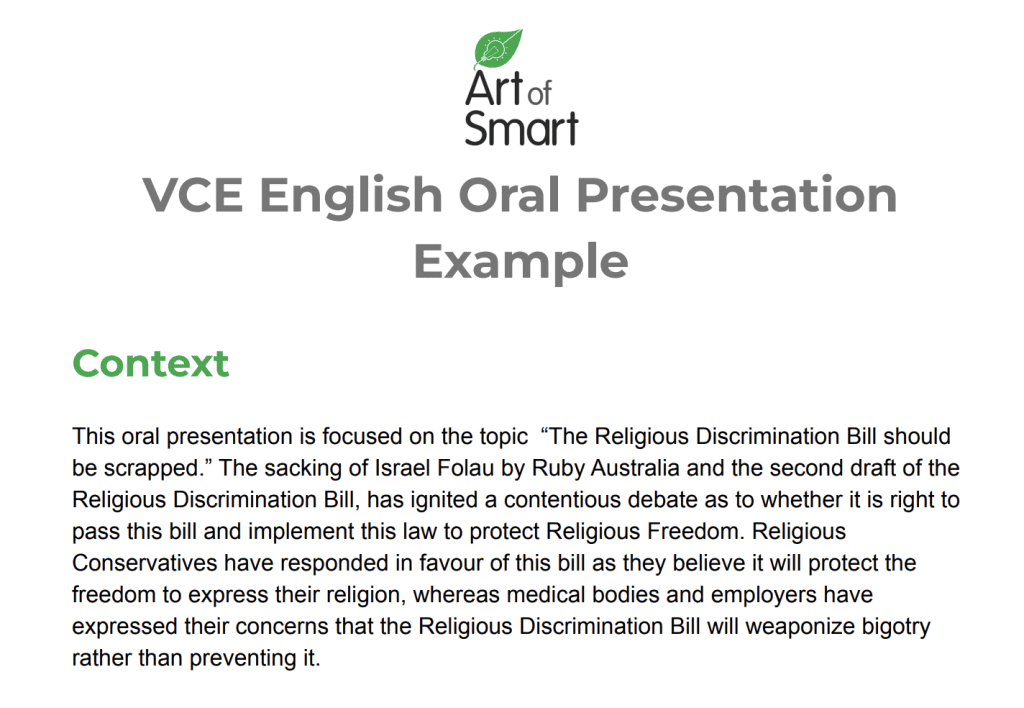Are you just getting started on your VCE English oral presentation, or find it daunting to speak in front of an audience?
If so, we can assure you that being as prepared as possible will allow you to make a great presentation and also calm your nerves!
To help you do this, we have provided a step-by-step approach to acing your VCE English Oral Presentation. Plus, we’ve got a downloadable annotated example just for you!
Let’s get right into it!
What is the VCE English Oral Presentation?
What are you required to do?
How to Approach the VCE English Oral Presentation
Preparing for Your Presentation
Presenting Your Speech
What is the VCE English Oral Presentation?
The VCE English oral presentation is the assessment task which tests your knowledge and skills for Outcome 2 of Unit 4 in the Study Design.
Learn more about VCE SACs and VCE English SACs + the Framework of Ideas!
The focus is on your ability to construct a sustained and reasoned point of view on an issue currently debated in the media.
Note: An Oral Presentation may be required in Unit 2 to which the following tips also apply.
The topic of your speech can be chosen by you, however, it must be a contemporary issue that has been debated in the media at any interval between September 1st of the previous year until the current time of assessment.
To make sure that you are aware of the several issues appearing in the media within the designated time period, it’s important to read newspapers and take note of the issues which may serve as potential topics for your speech!
Tip: Newspapers such as The Age and The Herald Sun are great points to start!
What are you required to do?
You will be allocated 5-8 minutes to present your stance on your chosen topic, and convince the audience of your views — you should consider multiple perspectives to the issue as well as the engagement of the audience.
Some schools may allow you to include a multimodal presentation that supports the context of your issue and audience, to accompany your speech.
Note: The specific requirements for your assessment may vary based on your school.
Key knowledge you will be assessed on:
- An understanding of arguments presented in texts
- The ways authors construct arguments to position audiences, using sound reasoning and use of evidence, and persuasive use of spoken language
- The conventions of discussion and debate
- The structures and conventions appropriate for spoken texts that present an argument
- The conventions for the acknowledgment of sources in spoken texts
- The conventions of spelling, punctuation and syntax of Standard Australian English
Learn more about acing your end of year VCE English exams!
How to Approach the VCE English Oral Presentation
#1: Choosing your Topic
The first step to acing your oral presentation is choosing the right topic — remember it must be a contemporary issue that has appeared in the media within the past year.
When deciding on your topic it is important to consider the larger social issues that it may fall under, such as societal inequality, poverty, quality of life, climate change, religious discrimination. However, remember that your chosen topic should be more specific as you won’t be able to discuss all the key points of these broader issues.
Examples of Topics:
- Compulsory Vaccinations
- Indigenous Australian “Close the Gap” Campaign
- Reintroducing Medevac
- Australia’s Refugee Policy
- The Repercussions of Working from Home
Once you have chosen your topic you need to decide on your contention, which is your view on the topic.
To produce a high-level oral presentation it is important to be passionate about your topic, as this transcends into your presentation. When you have a particular view on something everything from tone to your delivery becomes more convincing for the audience!
When writing out your contention, remember again to be specific.
For example, rather than choosing the issue ‘Discrimination on the basis of religion has no place in our society,’ you could narrow it down to, ‘The implementation of the Religious Discrimination bill in Australia, whilst being perceived to uphold equality, in reality has the potential to do more harm than good.’
In this way you are speaking specifically of the implementation of the bill, and not on all acts that may concern religious discrimination as a broader issue.
#2: Planning Before You Write
Before you begin writing your speech, it is important to consider a variety of aspects about your chosen topic.
These are as follows:
Identify a Persona
Adopting a persona that is relevant to the topic can enhance your speech, as your point of view is supported by your specific role in society.
For example, you could adopt the persona of a high-school teacher, in order to convince the audience of how the shift to online learning has significantly reduced the active involvement of students towards their education.
Identify Where You are Making the Speech
Paying attention to the setting of your speech is important, as this helps the audience engage with your speech and create a picture for themselves.
If you are speaking on the issue of climate change you could set your location as the Global Environment Summit.
Identify Your Target Audience
Targeting your speech towards a specific audience complements the earlier techniques and helps make your presentation have a greater impact on the audience. It allows you to give the audience a specific role or character to play whilst listening to your speech.
For example, on the topic of cancel culture you could address young leaders, members of the communication commission and victims of cancel culture.
What is the purpose of your speech? What do you want the audience to think?
In order to perfect your oral presentation you have to think of it as more than just an assessment. What is the lasting message you want the audience to have after listening to your speech?
On the topic of cancel culture, you may want to convince the young generation that cancel culture is not a proactive approach to implementing social change, and they should instead engage in more reasoned discussion to evaluate all aspects of the conversation.
#3: Research and Finding Your Evidence
Remember, a good speech has sufficient evidence to back up arguments! Once you have finalised your contention, research a variety of articles on your topic and collate evidence that supports your arguments as well as that which refutes it.
It is always important to consider the other side of your argument in order to best present your point whilst rationally rebutting others.
Types of Evidence include:
- Quotes from authority
- Statistics and Figures
- Analogies
- Personal anecdotes
- Expert Opinion
#4: Writing Your Speech
Step 1: Incorporate a Hook
The first part of writing your speech is to include a ‘HOOK start’ to draw your audience’s attention immediately. This may take any form of your liking including a quote or a rhetorical question.
For example, “When did Justice come to mean that we support punishment without a chance at redemption?”
Step 2: Address Your Audience Directly
Ensure that you show immediate awareness of your audience by addressing them directly. This can be done by referring to them as ladies and gentlemen, members of the community or parents and guardians.
You should choose a form of addressing your audience based on the target audience you had set earlier.
Step 3: Make Your Arguments
Remember to have a minimum of 3 clear arguments that support your contention, with a rebuttal in at least 2 of these arguments.
By including a rebuttal section within your arguments you increase the persuasive impact of it. As you refute the opposing ideas, it positions the audience to agree with your stance on the issue.
Step 4: Use Personal Tone and Rhetorical Questions
Adopting a personal tone by using pronouns such as “we” and “our” is also helpful in writing your speech as it creates a sense of inclusiveness for the audience as they feel a collective responsibility to join your stance on the issue.
The use of rhetorical questions can also be equally effective, as it leaves the audience with an obvious answer that supports your arguments.
Step 5: Back Up Your Points with Evidence
In addition to these other techniques you may wish to highlight significant pieces of evidence to make a large impact, as well as repeat your key ideas so the audience is constantly reminded of your stance.
Want to learn more about writing strong analysis? Check out our complete guide on writing VCE Argument Analysis for English!
Step 6: End Your Speech Strong!
The last step is to make a strong conclusion, with a lasting message. This could be a surprising statistic or a memorable quote.
For example, “Cancel Culture is: you’re all good, or you’re all bad and human nature is much more complicated than that.”
Think you might need some help acing this assessment? Build up your confidence with our English Melbourne tutoring team!
Preparing for Your VCE Oral Presentation
The most important aspect of an oral presentation is practice. Without practice it doesn’t matter how well you have pieced together your research to form a well written speech if your delivery is lacking.
It’s common practice to leave it to the last minute to start memorising your speech. However, in reality you should spend as long as possible memorising it!
It is important to note however that when we speak of practice, it is not enough to know what comes after what in your speech — rather it is about developing a persuasive tone of voice, which is usually lost when you simply read it off a piece of paper.
Also remember TIMING is KEY — you only get a few minutes to present your speech, so you don’t want too much information to the point where you’re speaking so fast and no one can understand what you’re saying. Equally you shouldn’t speak so slow that you are dragging on one particular point.
The best way to practise is to time yourself and speak in front of any audience, for example, parents or siblings.
Did you know that you can change which English subject you take in Year 12, even if you didn’t do it in Year 11? Check out our guide to selecting VCE subjects!
Presenting Your Speech
Of course the oral presentation, while having a written component, has a main focus on the spoken and delivery components.
The main things to consider for the presentation of your speech are:
- Tone of Voice
- Hand movements
- Eye contact
- Voice projection
Tone of Voice
The tone of voice is particularly important as it adds to the persuasiveness of the presentation. If you adopt a sympathetic tone, the audience can connect that to philanthropic and caring attitudes making them more likely to agree with you.
Conversely, when you use a tone of anger, the audience too are likely to be angered and determined to enforce a change.
Hand Movements and Gestures
Another physical element of presentation is hand movements, using your hands to emphasise significant statistics or evidence can also improve persuasiveness.
Eye Contact and Voice Projection
Other elements of presentation associated which increase the engagement of the audience include eye contact and voice projection.
When you are looking directly at the eyes of the audience they are more likely to pay attention to what you are saying.
For this reason it is important that if you are using cue cards, you should ensure they fit within your palm and only contain the important points. This ensures that you are not looking down at them the whole time or reading off them.
Likewise, with voice projection, a loud and determined voice will make it easier for the audience to understand the content of your speech and therefore make reasoned judgement.
Now you’re all set, and you’ll be able to make a great presentation!
Also preparing for your VCE English exams? Check out our Master List of VCE English past papers!
Need help managing your workload? Read our guide on how to manage multiple VCE SACs at once!
Are you looking for some extra help with preparing for your VCE English oral presentation?
We have an incredible team of VCE tutors and mentors!
We can help you master the VCE English study design and ace your upcoming VCE assessments with personalised lessons conducted one-on-one in your home or online!
It’s no use practicing to a wall! Why not get a tutor in Box Hill to listen and give useful feedback on how your English Oral Presentation is going?
We’ve supported over 8,000 students over the last 11 years, and on average our students score mark improvements of over 20%!
To find out more and get started with an inspirational VCE tutor and mentor, get in touch today or give us a ring on 1300 267 888!
Abhisha Vaheesan completed her VCE in 2021 and is currently an undergraduate student studying Bachelor of Radiography and Medical Imaging (Honours) at Monash University. As much as she is invested in Biology and putting together the building blocks of life, she is equally immersed in debating the conflicts of modern literature. Aside from this, she loves listening to music, is an avid writer and K-drama fanatic.








